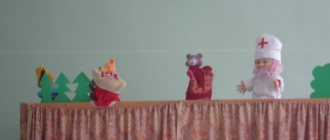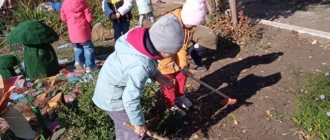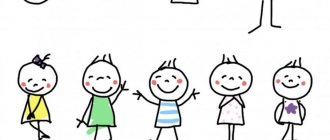MBDOU Kindergarten No. 12, Khodz village, Koshekhablsky district, Republic of Adygea.
Conversation – lesson “Magic words”
November 25, 2018
Goals :
Make children aware (using examples from works of fiction) that a truly polite person not only knows magic words, but also always tries to please other people. Accustom children to the idea that it is very difficult to get along without polite words in any society. Learn to analyze your actions and the actions of literary heroes, develop coherent speech and thinking. Cultivate love and respect for the people around you, a friendly attitude towards each other.
Equipment: Scene pictures on the topic, yellow and blue circles.
Preliminary work: reading to children the stories of V. Oseeva “Just an Old Lady”, “The Magic Word”, L.N. Tolstoy “Bone”, “Kitten”, C. Perrault “Magic”.. Conversation with children, children compiling stories from personal experience , reading poetry, learning proverbs.
Progress of the lesson:
Psychologist:
- Good afternoon! - they told you. How two strings are connected
- Good afternoon! - you answered. Warmth and kindness.
Psychologist: Guys, look how many guests we have. Let's say hello and smile to them. The guests smile back at you. Our smiles immediately made me brighter. I want to ask you what you would like to become when you grow up and become adults... Many glorious deeds await you, but first of all you must grow up to be real people: kind, brave, sympathetic, polite. This must be learned from early childhood.
Psychologist: Guys, today we will talk about politeness, good and bad deeds of people and magic words. All parents want their children to grow up polite.
- Which of you can explain what it means to be polite? How do you understand the word “politeness”? Who is called polite? What does it mean to be polite? – children’s answers.
Psychologist: This means being attentive to people; speak polite words; take care of people close to you; give way when going to a meeting; give way to girls and adults; thank you for your help; don't be rude; try to do something nice. In order to be polite, we must use magic words that make us feel warmer and happier. A kind word can do a small miracle - it can cheer a person up in difficult times, it can dispel a bad mood. That’s why such words are called “magic”.
When meeting friends and acquaintances, it is very easy for me to be polite,
I look into their eyes with a smile. I'll be the first to say hello.
Psychologist: Guys, how do you greet each other when you come to kindergarten in the morning? (Children's answers). Every person has a name. People have always taken care of their name and tried to glorify it with good deeds. It happens that guys laugh at someone’s name, thereby offending its owner. But a well-mannered person will never laugh at someone else's name.
Game: "Greetings!"
The children are divided into pairs, one greets the other, calling him affectionately by name. The second responds to the greeting, also calling affectionately by name.
Psychologist: What words do we use if we make a request? -children's answers: Be kind. Be so kind. Sorry, you can't tell me.
Psychologist: When do we give thanks? –children: You are so kind. Thank you. Thank you very much.
Psychologist: I’ll read you a poem: “Sorry.” Listen and tell me what magic word you heard here?
Dad broke a precious vase. Mom is silent, even smiling.
Grandmother and mother immediately frowned. “We’ll buy another one, there’s a better one on sale.”
But dad was found and looked them in the eyes. "Sorry!" It would seem, what’s wrong with it?
Both timidly and quietly, “Sorry,” he said. But what a wonderful word!
Psychologist: Listen to an excerpt from the poem “Kind Words.”
I met Vitya, a neighbor, and swooped in from around the corner!
— The meeting was sad: And imagine - in vain from Vitya
He hit me like a torpedo, I was waiting for the word......
Psychologist: What should Vitya say to his neighbor? -children: Sorry!
Psychologist: Guys, we often have to apologize. Let's remember how to apologize properly? -answers: (Sorry. I'm sorry. I'm guilty. Please forgive me, I didn't mean to offend you. I'm guilty of you. Sorry, I didn't mean to).
Psychologist: Let's look at another situation.
Poem: "We quarreled."
We quarreled with a friend, I didn’t offend her -
And they sat down in the corners. I just held the teddy bear
It's very boring without each other! She just ran away with the teddy bear!
We need to make peace. And she said: “I won’t give it up!”
Psychologist: Why did the girls quarrel? How do they feel? How can they make peace? Children's answers.
Psychologist: Listen, what proverbs can be called for these situations.
Stupid people quarrel, but smart people come to an agreement.
Quarrel does not lead to good things.
What words of farewell do you know? – children’s answers: See you tomorrow. See you soon. Bye.
Examination of pictures on the topic and discussion of them.
Psychologist: The power of “magic words” depends on how you say them: politely, affably, or in a sharp tone, turning away to the side.
LET'S TELL POEMS ABOUT POLITE WORDS: (I distributed the words to the children in advance)
“Hello,” you say to the person. Good night! Silence speaks
“Hello,” he smiles back. Everyone can hear it now.
And he probably won’t go to the pharmacy. He speaks in silent words:
And you will be healthy for many years. - Sleep, I will stay with you all night.
Good morning! The birds began to sing, Why do we say “Thank you”?
Good people, get out of bed. For everything they do for us.
All the darkness hides in the corners And we wouldn’t be able to remember
The sun has risen and is going about business. Who was told how many times.
They wish us. - Bon Voyage! It's not easy to be kind.
It will be easier to go and go. Kindness does not depend on height.
Of course, a good path will lead. All people are happy about kindness.
Also for something good. And in return she does not demand a reward.
Psychologist:
Kindness lives in the world
Only children in good hearts!
Game: "Guess."
Finish the sentence.
1. Even a block of ice will melt from a warm word... (thank you)
2. The old stump will turn green when it hears... (good afternoon)
3. When we are scolded for pranks, we say…..(Forgive us. Please).
4. The boy is polite and developed and says (Hello) when we meet.
Psychologist: Polite words make you feel warmer and happier. Do you know where the tradition of saying hello came from? greet each other? – children’s answers and teacher’s additions:
-When greeting, people extended their hands to each other. Why? For a long time people always went armed. When they met, they were afraid of each other, so when they were friendly, they extended their right hand. Showing that there are no weapons in it. Since then, this has become a tradition - a friendly handshake. And when they learned to speak, they began to say different words of greeting when they met.
Psychologist: How else can you greet each other? -children: Nod, bow. The military raises their hand to their cap. Men, greeting each other, sometimes raise their hats..(Photos, pictures).
Psychologist: You can greet each other in different ways. But deviating from a greeting and not answering it has always been considered the height of bad manners and disrespect for people. The bow and short words of greeting contain a very important content: “I treat you well and I want you to treat me the same way.”
Physical exercise.
- Let's say hello to each other. Stand in pairs, facing each other. Repeat after me the words and movements in chorus:
Good afternoon, my dear friend! (handshake).
Look around you (we turn our heads from side to side).
There is you here (we place our right hand on the neighbor’s shoulder).
I am here. (put your right hand on your chest).
Let's live together, friends! (We connect both hands with our palms to the hands of our neighbor).
Game "In the Circle of Magic Words"
- Let's all stand in a circle. Participants will take turns saying polite words. For each word you are given a flower petal, which is attached to the board. Words cannot be repeated.
(At the end of the game, the teacher draws attention to how magnificently the flower blossomed from their kind, magical words).
Psychologist: Being polite means not only saying polite words, but also trying to please other people. Give way, Let you go ahead, ask how you are.
Psychologist: Where do you think we should use polite words? – children’s answers: in the store, on the bus, at home, in kindergarten, on the street, i.e. everywhere and always. Guys, I would like to hear stories about how you yourself try to please the people around you. What do we get chips for? (Children's stories).
Psychologist: Well done, guys. You have very good stories. Now let's remember the literary works that we have read and from which we learned about the bad or good deeds of the heroes. I would like you to analyze the behavior of these children, their actions and express your attitude towards them, what you would do in their place.
Children's answers:
Psychologist: From Lev Nikolayevich Tolstoy’s story “The Bone,” we learned about the boy Vanya, who ate a plum without the permission of adults, lied to his mother, and then gave himself away. He turned out to be not only a liar, but also a coward. If I were him, I would rather ask my mother for permission to eat a plum or wait until my mother herself offers it to me.
Psychologist: From Valentina Oseeva’s story “Just an Old Lady,” we also learned about the good deed of a boy who helped a fallen old woman get up. The old lady was very grateful to him.
— “The Magic Word” by Valentina Oseeva.
Psychologist: - What magic word did grandfather tell Pavlik? - "Please".
Psychologist: How did this word change Pavlik? (What was he like before meeting his grandfather and what did he become after?).
“Pavlik was a rude, capricious, impolite boy. When he started using the word “please” when addressing people, his behavior changed. He became kind, obedient, polite.
Psychologist: How did the attitude of the people around him change towards Pavlik after he learned the magic word? Children: - Everyone began to treat him kindly. No one drove him away or scolded him anymore.
— “Magic” by Charles Perrault.
- Which of the girls behaved correctly? Do you want flowers to fall from your lips or toads to jump out? What do you need to do for this, what kind of person should you be?
Psychologist: Yes, guys, polite words and kind deeds really work wonders. They make people all over the world kinder, better, cleaner in soul. The rule of politeness prohibits us from making noise, disturbing, or irritating others. I am glad that you correctly understood the topic of our lesson. I think that magic words will be very useful to you in your life.
Proverbs. (children speak).
- 1. A man without friends is like a tree without roots. 2. Quarrel does not lead to good things.
- 3.A friend in need is a friend indeed.
- 4.Help your friend everywhere, don’t leave him in trouble.
- 5.Time for business, time for fun...
- 6.Easy to break, but difficult to do.
- 7. Do good things - make yourself happy. 8. Kind words are more valuable than wealth.
- 9.The word heals and the word cripples.
Game "Polite - Impolite."
- Listen carefully. If I'm talking about a polite action, raise the yellow circle; if I'm talking about an impolite action, raise the blue circle.
1. Smile when you meet. 6. Say hello.
2. Push a friend. 7. Protect the weak.
3. Call someone bad words. 8. Hit someone.
4. Give something to a friend. 9. Teasing someone.
5. Calm the crying person. 10. Help the educator, teacher.
Bottom line.
- Guys, what magic words did we talk about today?
- Why are they called magical?
— How do magic words help us in life? (Children's complete answers).
Psychologist:
Poem "Strange Things"
Strange things happen to me: I smile and the grief ends!
I'm upset - everyone is upset. There are cheerful faces everywhere!
And sad people meet, Everywhere trees shake with laughter!
And the trees sway sadly... But why does this happen?
- Guys, why is this happening? (children's answers). “You need to set yourself up for good and treat others kindly, and they will answer you in kind.” You must understand that you cannot live without good and kind friends. It’s not too lazy to say kind, magical words to us all day long. To give people joy, you need to be kind and polite. Each of us has a little sun inside us. This sun is kindness. A kind person is one who loves people and helps them. And love and help warm you like the sun.
Give everyone some sunshine - Words of love and tenderness
A piece of light, kindness. Give to people like flowers!
- Now let's give our guests such kind, magical sunshine! (Children give each guest smiling suns they made earlier.)
- Well done boys! You worked very well today!
Magic words in life
Kind, magical words are very necessary to use in everyday life. They make our world a kinder place, help lift the spirits of those around us, and give hope to those who need it. Polite words are like a “golden key” that can open any door. These words make you feel lighter, happier and warmer.
Magic words seem to be nothing special, words are just words. But try to say them in your life, and you will notice how people will begin to help you, answer your questions friendly, empathize with you, and become friends with you. Let's take a closer look at the project and involve my 4th grade students in collaboration.
Rules of behavior that have evolved over centuries help people understand each other and help avoid conflict situations.
Polite words are divided into several groups:
- greeting words: hello, good morning, good afternoon;
- words of gratitude: thank you, thank you;
- words of request: please, allow me, be kind, be kind;
- words of apology: sorry, sorry, excuse me, please;
- words of praise: well done, smart girl.
Research on magic words
Together with the teacher, we conducted an experiment in our class to find out how well children know polite words, how often they use them in their speech, and what effect polite words have on people’s mood and relationships.
The survey showed that my classmates know a lot of polite words, distinguish kind words from rude ones, and know the impact rude expressions have on people’s relationships. Some guys allow themselves to talk rudely to their comrades, but the guys don’t like it when people talk to them rudely.
Watching the guys, we found out that the guys often simply forget to use polite words in their speech. Thus, 3 people forgot to say hello to the teacher when they met, which is 42% of all students, and 4 people, which is 57%, forgot to say hello to their classmates. It was also noticed that the girls in our class are more polite.
A lot also depends on pronunciation. Roughly spoken words will never become magical.
The proof is an experiment we conducted. We asked two students from the class to make a request to the guys in different forms. The first student had to address him in a rude manner, and the second in a polite manner. In the first case, the request was denied, but in the second, it was allowed.
During the lesson, we discussed the meaning of proverbs, sayings about kindness and politeness, developed rules of politeness. We also agreed to say polite words to each other during the “Day of Politeness.” The guys participated in the event with interest, did not quarrel, spoke polite words to each other, tried to play together and give in to each other.
A week later we repeated the study.
According to the results of the study, we found that the mood and relationships of the children improved, the children became friendlier, learned more polite words and began to use them more often in communication. This makes me happy.
Conclusion: the study showed that the hypothesis “The tongue will not wither from polite words” is correct, because it is easy and pleasant to say polite words, saying kind words becomes a good habit and this improves relationships.
Observations of classmates showed that the guys began to call names less and, most importantly, that the class became much friendlier.
The study proved that polite words are truly special words because every word has an impact on a person.
During the study, rules of politeness were derived that will help lift the mood of others, and therefore help people communicate more easily with each other.
Project conclusions:
- We found that polite words affect the mood of others;
- The rules of politeness that were drawn up helped to improve the mood of those around us, as well as easier contact between people.
- We prepared reminders for students with rules of politeness.




